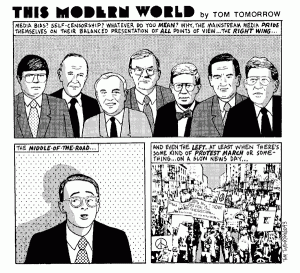
Courtesy of http://thekexperience.okeiweb.com
In common political discourse, mass media is often ranked on a one-dimensional spectrum — on one end “free” and, on the other end, “not free.” Coming from the communist country of China, however, I find the issue much more complicated. I see a fair number of cases where the Chinese media, despite its heavy censorship, actually turned out to have reported a closer version of the actual events, in retrospect, than the mostly free American press. Part of it may simply be faulty journalism, but there is no doubt some other factor at work here.
Raymond Wong, one of the most prominent democracy activists in China, identifies five major influences on the mass media. First, government influence, such as political censorship; second, internal corporate influence, such as pressure from the owners of a media company; third, external corporate influence, such as the pressure of advertisers; fourth, social influence, such as the perceptions of the public; and finally, self-influence, such as the personal beliefs of a journalist.
The first, government influence, is obviously much more widespread in countries like China than in the United States. The other four, however, are arguably more powerful in countries with developed civil societies like the U.S. While one may argue that the kind of corporate influence, say from internal management, tends to be pretty mild and will never reach the scale of the massive oppression in China, it is debatable which one is in fact more effective in the end.
Speaking as someone who grew up in China, it is usually pretty easy to see through the misrepresentations and propaganda in Chinese state media — distilling facts from fiction in the American media, however, is often much more complicated in my experience.
One way of explaining this is the idea that there are essentially two forms of media bias; first, “objective” bias, a pure distortion of the truth and failure to report on actual facts; second, “subjective” bias — such as omission of context, selective reporting, and relying on sources that favor one particular side. Chinese state media, for various reasons, tend to be mostly filled with objective biases — and, in an age where people are becoming more and more cynical of authority, and where communications are increasingly hard to restrict, it simply isn’t very effective.
American mass media, however, tend to fall prey to subjective biases, intentionally or not. An example to illustrate this would be the choice of words: A media watchdog monitored the use of the word “retaliation” in relation to reports on the Israeli-Palestinian conflict and found that 79 percent of the uses of the word were used to describe Israeli attacks, while only 9 percent of the uses described Palestinian attacks.
Whatever your opinion is on the conflict, it seems pretty obvious that military offensives are simply military offensives, and it would be extremely difficult to pinpoint the motives underlying them. Yet the American media more often than not chose to give a rationale to Israeli offensives and not to Palestinian offensives.
A more interesting example would be the widespread accusations that the mass media has a “liberal bias.” There is, in fact, a lot of data showing that the mass media leans somewhat conservative. One study by Fairness and Accuracy in Reporting (FAIR) showed that 45 percent of media citations come from conservative sources, only 10-15 percent comes from progressive sources and the rest coming from centrist sources.
The above examples are certainly attributable to some extent to the corporate and ideological influence of the mass media, but this link is hard to explore and also hard to eradicate.
However, even in terms of government influence, the American media may not be as free as some might think. Think of the few elite correspondents stationed at the White House and the government’s ability to remove their privileged positions if they were to publish any unfavorable coverage.
The journey to eradicate mass media from its various societal influences is clearly far from over. The American media establishment is a huge step forwards from the Chinese state media, but it has much to learn. It is important to remember that as consumers and perhaps producers of information, we do have the power and responsibility to effect changes in the media structure.


